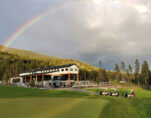Helping kids learn risk-taking skills
By Medicine Hat News Opinon on October 30, 2018.
Play that doesn’t challenge kids isn’t helping them develop vital skills Lethbridge city council recently threw its support behind letting kids play — and even allowing them to engage in “risky play.” Council unanimously endorsed a new Play Charter for the City of Lethbridge, following in the footsteps of Calgary, which passed a similar charter last winter. The proposal, brought before council last week by the Lethbridge Early Years Coalition, supports play that encourages the physical, emotional and social development of children in the community. That includes supporting the concept of “risky play,” such as letting kids do things that used to be common childhood activities, such as climbing trees. “In our society we are seeing a shift where parents are bubble-wrapping kids and protecting them from healthy risks such as climbing a tree, and even possibly falling out of that tree,” Vicki Hazelwood of the LEYC explained. “There is healthy risk, and there is unhealthy risk. We want to see more of that healthy risk happening in our community.” The LEYC isn’t alone in that view. Child development expert Rae Pica, in an article titled “Busting the Myth That We Have to Bubble Wrap Our Kids” on the website parenttoolkit.com, wrote: “Kids who grow up afraid of risk will not be problem solvers. They will not be resilient. They will certainly not be able to handle risk, which is inherent in life, when it comes along. Many, in fact, will crumble. And children raised in a culture of fear? Well, that’s just asking for trouble.” Pica recommends parents check out Lenore Skenazy’s blog, “Free-Range Kids.” Skenazy is the author of the book “Free-Range Kids: How to Raise Safe, Self-Reliant Children (Without Going Nuts with Worry),” in which she argues that parents who try to prevent every potential danger or difficulty in their child’s everyday life are not allowing their children the opportunity to grow up. The matter of how much free rein to give kids is a polarizing topic, as Skenazy discovered when she wrote a column for the New York Sun on “Why I Let My 9-Year-Old Take The Subway Alone.” It sparked a national debate and had critics suggesting she was “America’s Worst Mom.” In spite of the criticism, Skenazy believes children “deserve a life outside the cage.” So do many other parents, and research supports them in the notion that it’s good for their kids. In an article on psychology.com called “Risky Play: Why Children Love It and Need It,” research professor Peter Gray notes: “In risky play, youngsters dose themselves with manageable quantities of fear and practice keeping their heads and behaving adaptively while experiencing that fear. They learn that they can manage their fear, overcome it, and come out alive.” There’s a price to be paid for depriving kids of such opportunities. Gray continues: “Over the past 60 years we have witnessed, in our culture, a continuous, gradual, but ultimately dramatic decline in children’s opportunities to play freely, without adult control, and especially in their opportunities to play in risky ways. Over the same 60 years we have also witnessed a continuous, gradual, but ultimately dramatic increase in all sorts of childhood mental disorders, especially emotional disorders.” Overprotective parents who seek to shield their children from all risks are not helping their kids; they’re stifling their development into confident, independent, capable adults with coping skills and problem-solving abilities. Playtime free from hovering parents is a crucial part of that development. In supporting free and, yes, sometimes risky play (within reason) for kids, the Lethbridge Play Charter is a wise blueprint for parents who want to raise strong, healthy kids. — Lethbridge Herald 15-14




